新概念英语青少版1A:Unit 10 Jump in! 课件 (23张PPT)
文档属性
| 名称 | 新概念英语青少版1A:Unit 10 Jump in! 课件 (23张PPT) |

|
|
| 格式 | zip | ||
| 文件大小 | 4.3MB | ||
| 资源类型 | 教案 | ||
| 版本资源 | 新概念英语 | ||
| 科目 | 英语 | ||
| 更新时间 | 2019-06-18 15:35:46 | ||
图片预览

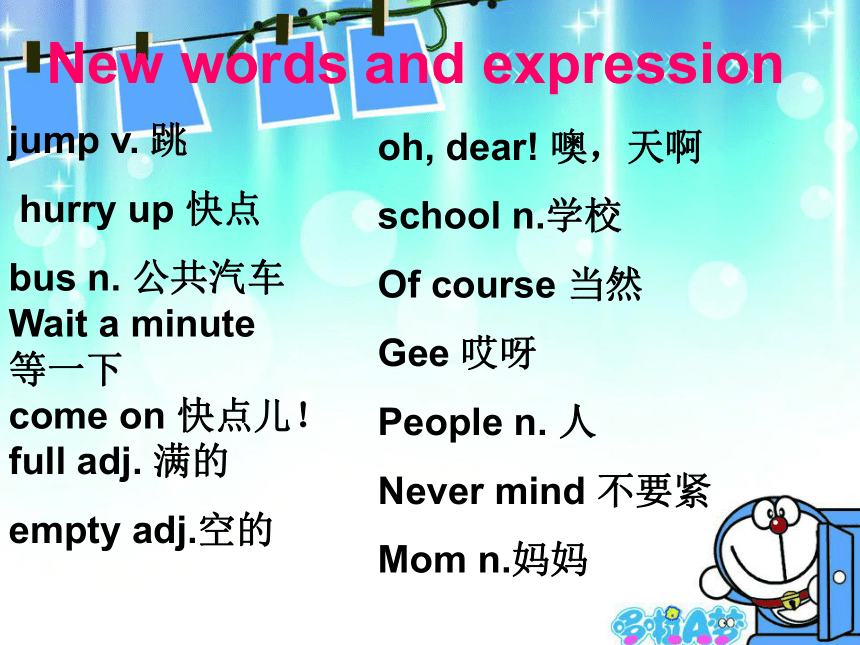

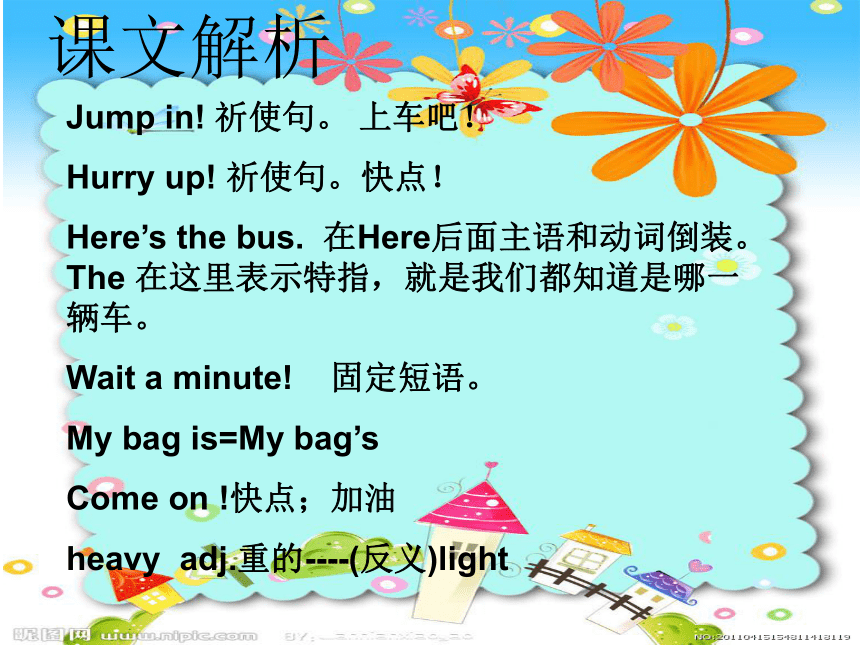
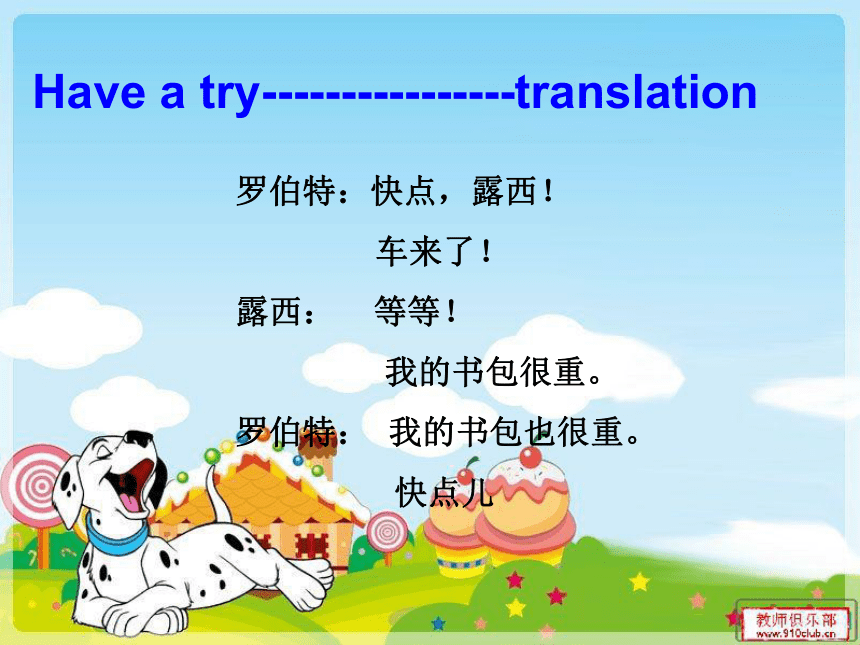
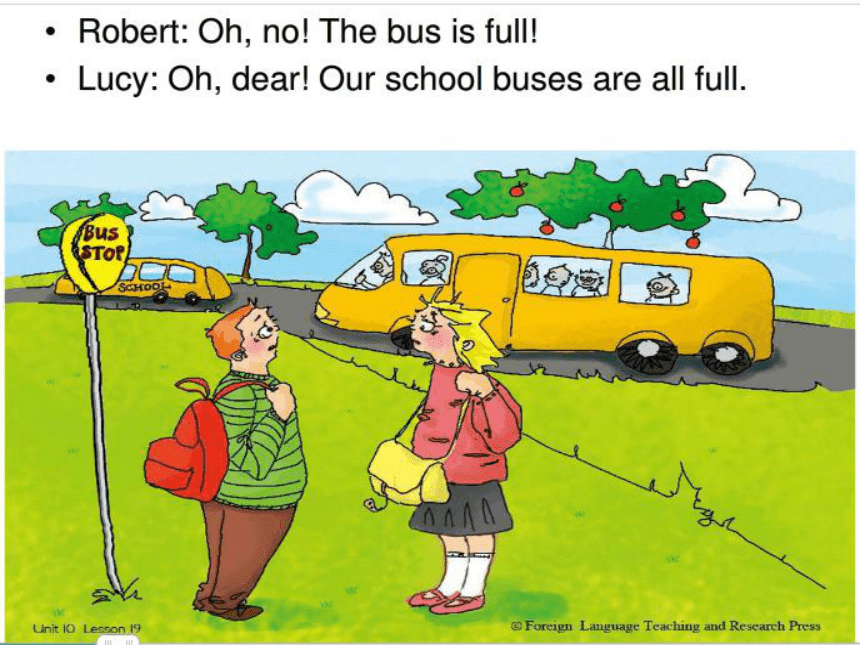


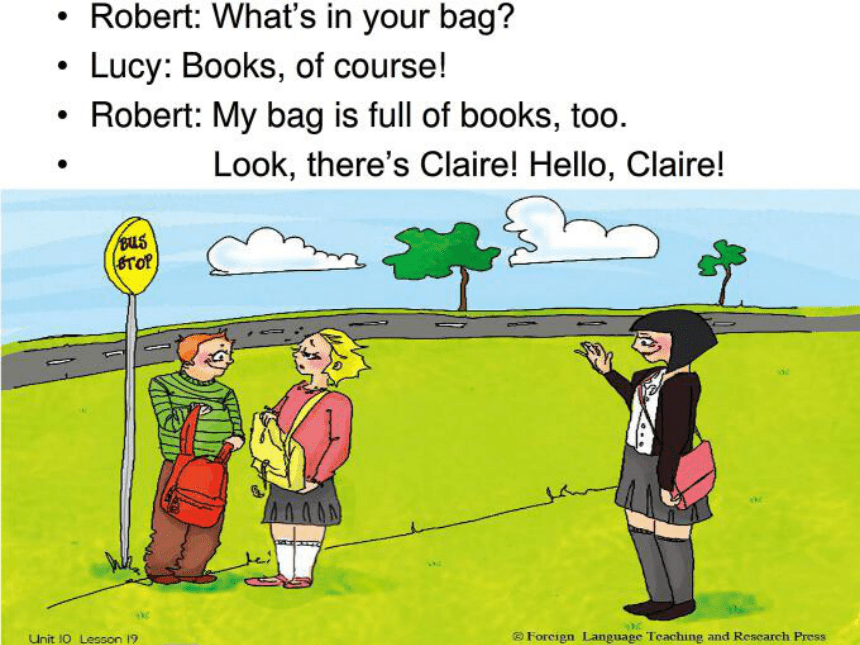
文档简介
课件23张PPT。Unit10 Jump in!Lesson 19New words and expressionjump v. 跳
hurry up 快点
bus n. 公共汽车
Wait a minute
等一下
come on 快点儿!
full adj. 满的
empty adj.空的
oh, dear! 噢,天啊
school n.学校
Of course 当然
Gee 哎呀
People n. 人
Never mind 不要紧
Mom n.妈妈课文解析Jump in! 祈使句。 上车吧!
Hurry up! 祈使句。快点!
Here’s the bus. 在Here后面主语和动词倒装。The 在这里表示特指,就是我们都知道是哪一辆车。
Wait a minute! 固定短语。
My bag is=My bag’s
Come on !快点;加油
heavy adj.重的----(反义)light
罗伯特:快点,露西!
车来了!
露西: 等等!
我的书包很重。
罗伯特: 我的书包也很重。
快点儿
Have a try----------------translation课文解析
1.Oh, no !表示沮丧
Oh, dear!表示遗憾或者沮丧。2.Our school buses are all full. Our 是第一人称复数物主形容词。all是分配形容词,all要在be动词的后面
full adj. 满的。常见的短语有:be full of = be filled with 充满
eg. (1)The bus is full of people.
(2)our life is filled with happiness.Translation 罗伯特:奥,糟了!车满了!
露西:噢,天啊!我们的校车都满了!I can do it!Translation罗伯特:你的书包是什么?
露西:当然是书了!
罗伯特:我的书包也装满了书。
看,那是克莱尔。你好,克莱尔!I will think about itTranslation克莱尔:你好,罗伯特!
你好,露西!怎么了,露西?
露西:校车都满了,而我们的书包很重。I can do it! can you do it ?Translation克莱尔:哎呀,是很重!
里面装的是什么西?
罗伯特:里面装满了书,
而车上人又满了。课文解析1.图三:In your bag in地点介词=inside (在里面)2.图四:the buses-----定冠词与名词复数连用表示特指:表示 “you know which buses I mean”(你知道我指的是哪些车)3.图五:Gee!----表示吃惊的感叹词。
They are heavy! 由于Claire 比较吃惊,are 要重读
full of
像books,people(单数是person)这些复数名词前面不 加冠词Translation克莱尔:别担心!
我妈妈开着车来了。
这车是空的,
快上车吧,
把你们的书包也放进去!So easy! 课文解析1.图六:never mind!=please don’t worry about it (不用担心)用于提供问题解决的办法2.With the car ------with 最常用的意思是 “in the company of” (和……在一起)e.g. lesson 11 with the Jenkins family
-------with还有用或者可供使用e.g. lesson 5 with the white umbrella. 如果克莱尔指的是她妈妈所在的车,她会说in the car.但是她说的是with the car,因为车子是available for use 可使用。
3.Jump in, and put your bags in, too! 祈使句。名词变复数一.一般名词复数是在名词后面加上“s”,如map→ maps, bag→ bags,dog →dogs, cat → cats等;? 二、凡是以s、z、x、ch、sh结尾的词,在该词末尾加上后辍-es构成复数。?读音变化:统一加读[iz]。? 例:bus→ buses; fox→ foxes; match→ matches; flash→ flashes ;box →boxes; watch →watches; class→ classes;
三、以辅音字母+y结尾的名词,将y改变为i,再加-es。? 读音变化:加读[z]。? 例:candy →candies; lady→ ladies; story→ stories? strawberry →strawberries; baby →babies; puppy →puppies; library →libraries; dictionary →dictionaries; activity →activities? family →families; baby →babies 四、以-f或-fe结尾的名词,多为将-f或-fe改变为-ves,但有例外。? 读音变化:尾音[f]改读[vz]。? 例:knife→ knives; life→ lives; leaf→ leaves; staff(员工)→staves; scarf(围巾)→scarves? 目前搜集的直接加s: roof-roofs, belief-beliefs, gulf(海湾)-gulfs, chief(负责人)-chiefs? 这几个可变可不变: scarf- scarfs, handkerchief- handkerchiefs? 名词复数的不规则变化? 1)child---children foot---feet tooth---teeth? mouse---mice man---men woman---women?
2)单复同形 如:? deer, sheep, Chinese, Japanese?
3)集体名词,以单数形式出现,但实为复数。? 如: people police cattle 等本身就是复数,不能说 a people, a police, a cattle,但可以说? a person, a policeman, a head of cattle, the English, the British, the French ,the Chinese, the Japanese, the Swiss 等名词,表示国民总称时,作复数用。?
hurry up 快点
bus n. 公共汽车
Wait a minute
等一下
come on 快点儿!
full adj. 满的
empty adj.空的
oh, dear! 噢,天啊
school n.学校
Of course 当然
Gee 哎呀
People n. 人
Never mind 不要紧
Mom n.妈妈课文解析Jump in! 祈使句。 上车吧!
Hurry up! 祈使句。快点!
Here’s the bus. 在Here后面主语和动词倒装。The 在这里表示特指,就是我们都知道是哪一辆车。
Wait a minute! 固定短语。
My bag is=My bag’s
Come on !快点;加油
heavy adj.重的----(反义)light
罗伯特:快点,露西!
车来了!
露西: 等等!
我的书包很重。
罗伯特: 我的书包也很重。
快点儿
Have a try----------------translation课文解析
1.Oh, no !表示沮丧
Oh, dear!表示遗憾或者沮丧。2.Our school buses are all full. Our 是第一人称复数物主形容词。all是分配形容词,all要在be动词的后面
full adj. 满的。常见的短语有:be full of = be filled with 充满
eg. (1)The bus is full of people.
(2)our life is filled with happiness.Translation 罗伯特:奥,糟了!车满了!
露西:噢,天啊!我们的校车都满了!I can do it!Translation罗伯特:你的书包是什么?
露西:当然是书了!
罗伯特:我的书包也装满了书。
看,那是克莱尔。你好,克莱尔!I will think about itTranslation克莱尔:你好,罗伯特!
你好,露西!怎么了,露西?
露西:校车都满了,而我们的书包很重。I can do it! can you do it ?Translation克莱尔:哎呀,是很重!
里面装的是什么西?
罗伯特:里面装满了书,
而车上人又满了。课文解析1.图三:In your bag in地点介词=inside (在里面)2.图四:the buses-----定冠词与名词复数连用表示特指:表示 “you know which buses I mean”(你知道我指的是哪些车)3.图五:Gee!----表示吃惊的感叹词。
They are heavy! 由于Claire 比较吃惊,are 要重读
full of
像books,people(单数是person)这些复数名词前面不 加冠词Translation克莱尔:别担心!
我妈妈开着车来了。
这车是空的,
快上车吧,
把你们的书包也放进去!So easy! 课文解析1.图六:never mind!=please don’t worry about it (不用担心)用于提供问题解决的办法2.With the car ------with 最常用的意思是 “in the company of” (和……在一起)e.g. lesson 11 with the Jenkins family
-------with还有用或者可供使用e.g. lesson 5 with the white umbrella. 如果克莱尔指的是她妈妈所在的车,她会说in the car.但是她说的是with the car,因为车子是available for use 可使用。
3.Jump in, and put your bags in, too! 祈使句。名词变复数一.一般名词复数是在名词后面加上“s”,如map→ maps, bag→ bags,dog →dogs, cat → cats等;? 二、凡是以s、z、x、ch、sh结尾的词,在该词末尾加上后辍-es构成复数。?读音变化:统一加读[iz]。? 例:bus→ buses; fox→ foxes; match→ matches; flash→ flashes ;box →boxes; watch →watches; class→ classes;
三、以辅音字母+y结尾的名词,将y改变为i,再加-es。? 读音变化:加读[z]。? 例:candy →candies; lady→ ladies; story→ stories? strawberry →strawberries; baby →babies; puppy →puppies; library →libraries; dictionary →dictionaries; activity →activities? family →families; baby →babies 四、以-f或-fe结尾的名词,多为将-f或-fe改变为-ves,但有例外。? 读音变化:尾音[f]改读[vz]。? 例:knife→ knives; life→ lives; leaf→ leaves; staff(员工)→staves; scarf(围巾)→scarves? 目前搜集的直接加s: roof-roofs, belief-beliefs, gulf(海湾)-gulfs, chief(负责人)-chiefs? 这几个可变可不变: scarf- scarfs, handkerchief- handkerchiefs? 名词复数的不规则变化? 1)child---children foot---feet tooth---teeth? mouse---mice man---men woman---women?
2)单复同形 如:? deer, sheep, Chinese, Japanese?
3)集体名词,以单数形式出现,但实为复数。? 如: people police cattle 等本身就是复数,不能说 a people, a police, a cattle,但可以说? a person, a policeman, a head of cattle, the English, the British, the French ,the Chinese, the Japanese, the Swiss 等名词,表示国民总称时,作复数用。?
同课章节目录
- Unit 1 Meet the family!
- Unit 2 What is it?
- Unit 3 Who's that?
- Unit 4 Robert isn't well.
- Unit 5 Meet the neighbours!
- Unit 6 Gossip!
- Unit 7 Where's my pen?
- Unit 8 A bump in the nighe!
- Unit 9 Red,white and...pink!
- Unit 10 Jump in!
- Unit 11 Very smart!
- Unit 12 Just like you!
- Unit 13 Late or early
- Unit 14 One,two,three,catch!
- Unit 15 That's not fair!
